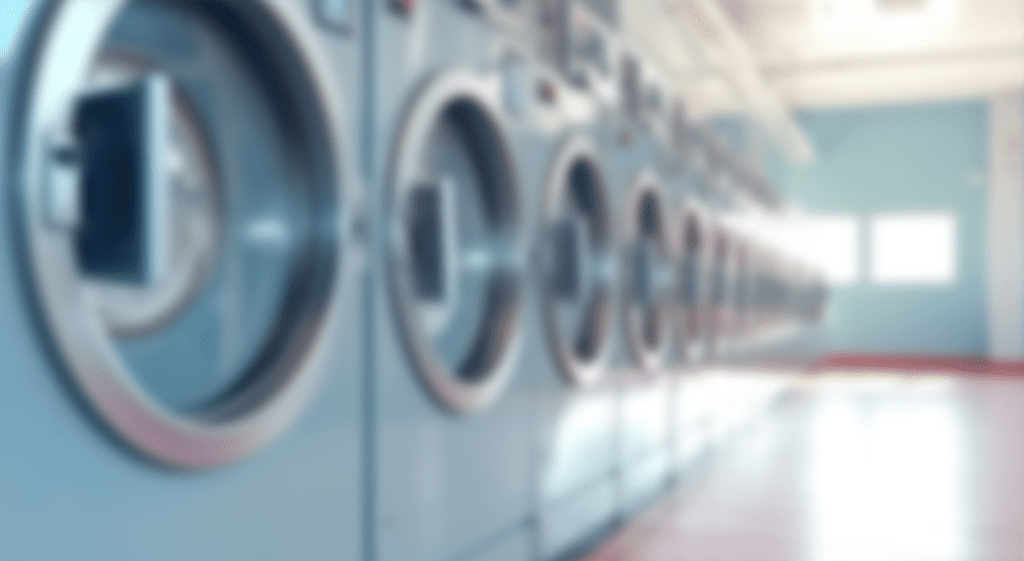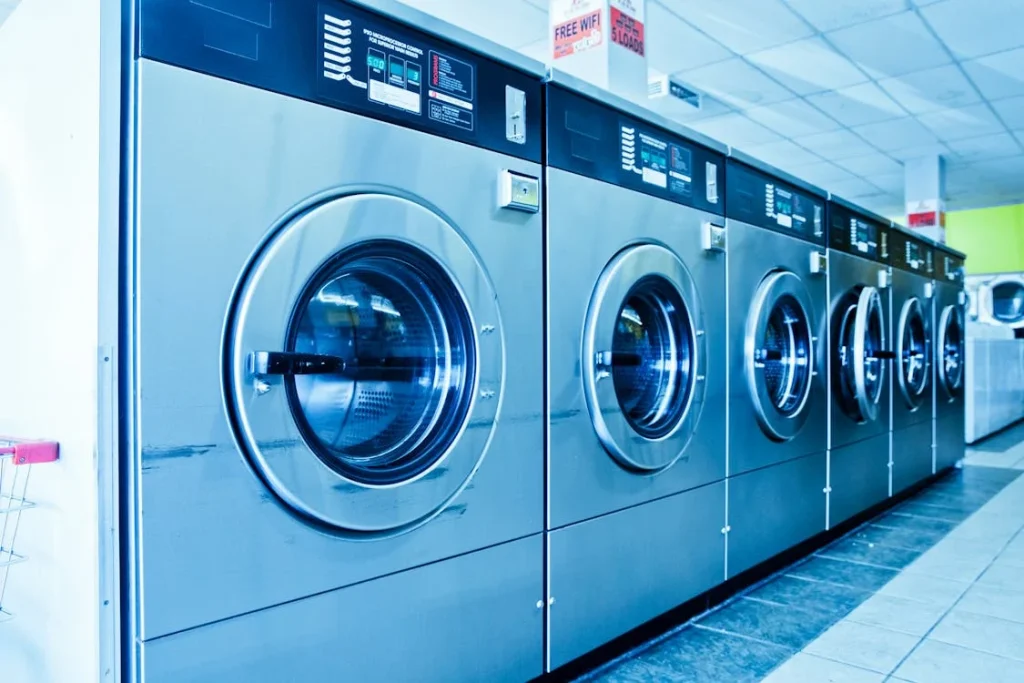Industrial washing machines are built for heavy-duty tasks, providing high performance and durability to meet the needs of businesses like hospitals, hotels, and laundry services. In this guide, we’ll explore the different types of industrial washing machines, their features, and how to select the best one for your specific needs, allowing you to gain a clear understanding of the options available.
1. Understanding Industrial Washing Machines
Industrial washing machines come in various shapes, sizes, and designs to cater to different business needs. These machines are designed to withstand continuous use, handling a higher volume of laundry than their domestic counterparts. But what exactly sets industrial washers apart?
1.1. What Sets Industrial Machines Apart from Household Ones?
Industrial washers are engineered to handle much heavier loads. While a household washing machine typically has a capacity of 7-10 kg, an industrial model can handle upwards of 20 kg per load. Additionally, industrial machines have specialized features like faster wash cycles, more powerful motors, and advanced control systems for better performance in high-demand environments.
1.2. Key Features of Industrial Washing Machines
Key features of industrial washers often include programmable settings, higher spin speeds for reduced drying times, and larger drum capacities. Some machines also offer water recycling systems, helping businesses reduce their water consumption and lower operating costs.
2. Types of Industrial Washing Machines
There are several types of industrial washing machines, each designed for specific laundry needs. Let’s dive into the most common types you’ll encounter.
2.1. Front-Loading Industrial Washing Machines
Front-loading machines are often considered the most efficient option for industrial laundry. They use gravity to help with the wash process, which typically results in better water extraction, reduced energy consumption, and shorter drying times.
2.1.1. Advantages of Front-Loading Machines
One of the biggest advantages of front-loading machines is their energy efficiency. Since they use less water and detergent, businesses can reduce costs while still achieving excellent cleaning results. Additionally, front-loading machines are gentle on fabrics, which is important for preserving the quality of linens or uniforms over time.
2.1.2. Disadvantages of Front-Loading Machines
However, these machines tend to have a longer wash cycle, which may not be ideal for businesses that require fast turnaround times. Also, they are generally more expensive upfront, which could be a consideration for smaller operations with limited budgets.
2.2. Top-Loading Industrial Washing Machines
Top-loading industrial washing machines are a more traditional option and are typically easier to maintain. Unlike front-loading machines, they allow users to add clothes during the wash cycle, which can be convenient for certain laundry processes.
2.2.1. Advantages of Top-Loading Machines
Top-loading machines tend to be less expensive than their front-loading counterparts, making them a more budget-friendly choice. They also often have faster wash cycles and are easier to repair, as the components are more accessible.
2.2.2. Disadvantages of Top-Loading Machines
On the downside, top-loaders are less energy-efficient, using more water and detergent. They also don’t provide the same level of fabric care as front-loaders, which might lead to more wear and tear on linens and garments.
2.3. Tunnel Washers
Tunnel washers are a type of continuous batch washing machine designed for high-volume laundry operations. These machines are typically used in environments like hospitals, hotels, and large laundry services, where large amounts of linen need to be processed quickly and efficiently.
2.3.1. What Are Tunnel Washers?
Tunnel washers consist of a series of washing sections connected in a line, allowing garments or linens to pass through each stage of washing, rinsing, and extracting in a continuous flow. This system is highly efficient and can handle hundreds of kilograms of laundry in a short amount of time.
2.3.2. Advantages of Tunnel Washers
The biggest advantage of tunnel washers is their ability to handle large volumes of laundry quickly. They also use less water and energy than batch washers because they operate on a continuous cycle. This makes them a great choice for large-scale operations looking to maximize productivity and minimize costs.
2.3.3. When Are Tunnel Washers Ideal?
Tunnel washers are best suited for large operations with heavy laundry demands. They are particularly effective in environments like hospitals, where linens must be cleaned and disinfected to the highest standards.
2.4. Flatwork Ironers
While not technically a washing machine, flatwork ironers are essential for many industrial laundry operations. These machines are designed to press large sheets, towels, and other flat items, creating a smooth, wrinkle-free finish.
2.4.1. How Flatwork Ironers Integrate with Industrial Washers
In most industrial laundry setups, flatwork ironers work alongside washing machines to provide a complete laundry solution. After items are washed, they are passed through the ironer to remove wrinkles and achieve a crisp, polished finish.
2.4.2. Advantages of Flatwork Ironers
Flatwork ironers increase efficiency by reducing the time and labor required for manual ironing. They also ensure a consistent, high-quality finish, which is particularly important in industries like hospitality, where presentation matters.
3. Choosing the Right Type for Your Business
When selecting an industrial washing machine, there are a few factors to consider to ensure you choose the best fit for your business needs.
3.1. Considerations for Large Scale Operations
If you run a large-scale operation, such as a hospital or a hotel chain, you’ll need a machine that can handle high volumes of laundry. Tunnel washers are often the ideal choice in these cases, as they can process massive loads with minimal downtime.
3.2. How to Determine the Best Machine for Your Needs
To determine the best industrial washing machine for your business, consider factors like load capacity, cycle times, energy efficiency, and ease of maintenance. The right machine should align with your specific laundry requirements and budget constraints.
3.2.1. Capacity and Efficiency
If you’re dealing with large amounts of laundry, look for a machine that offers both high capacity and efficiency. A machine that can clean a large load in a short period of time will increase productivity and reduce labor costs.
3.2.2. Maintenance and Cost of Ownership
Don’t forget to factor in the cost of maintenance and the machine’s long-term durability. Opting for a slightly more expensive machine with lower maintenance costs over time might be more economical in the long run.
4. Common Mistakes to Avoid When Choosing Industrial Washing Machines
4.1. Overlooking Energy Efficiency
It’s easy to focus solely on upfront costs, but energy efficiency can significantly affect your long-term operating expenses. Be sure to choose a machine with energy-saving features like optimized water usage and lower energy consumption per cycle.
4.2. Ignoring Maintenance Requirements
Ignoring the maintenance needs of an industrial washing machine can lead to unexpected costs down the road. Choose a machine with accessible parts and good customer service support to minimize downtime and repair costs.
5. Conclusion: Making the Right Choice for Your Laundry Operations
Choosing the right industrial washing machine is essential for any business looking to maintain efficiency, reduce costs, and ensure the quality of its laundry. By understanding the different types of machines available and considering factors like capacity, energy efficiency, and maintenance, you’ll be able to select the best option for your needs.
If you’re unsure where to start or need expert advice on choosing the right industrial washing machine for your business, get in touch with us today!
6. FAQs
What is the difference between front-loading and top-loading industrial washing machines? Front-loading machines are more energy-efficient and gentle on fabrics, while top-loading machines are quicker and easier to maintain but tend to use more water.
Are tunnel washers worth the investment for smaller businesses? Tunnel washers are ideal for large-scale operations with high laundry volumes. For smaller businesses, a more traditional washing machine might be a better fit.
How can I improve the efficiency of my industrial washing machine? Regular maintenance, using the right detergents, and choosing machines with energy-saving features can help improve efficiency.
What’s the typical lifespan of an industrial washing machine? Most industrial washing machines last between 7-15 years, depending on the brand, usage, and maintenance.
What should I consider when choosing a machine for my laundry business? Consider load capacity, cycle times, energy efficiency, and ongoing maintenance costs to ensure you’re making the right investment.
Here are some other articles that we think might interest you:
Environmental Impact of Industrial Laundry


